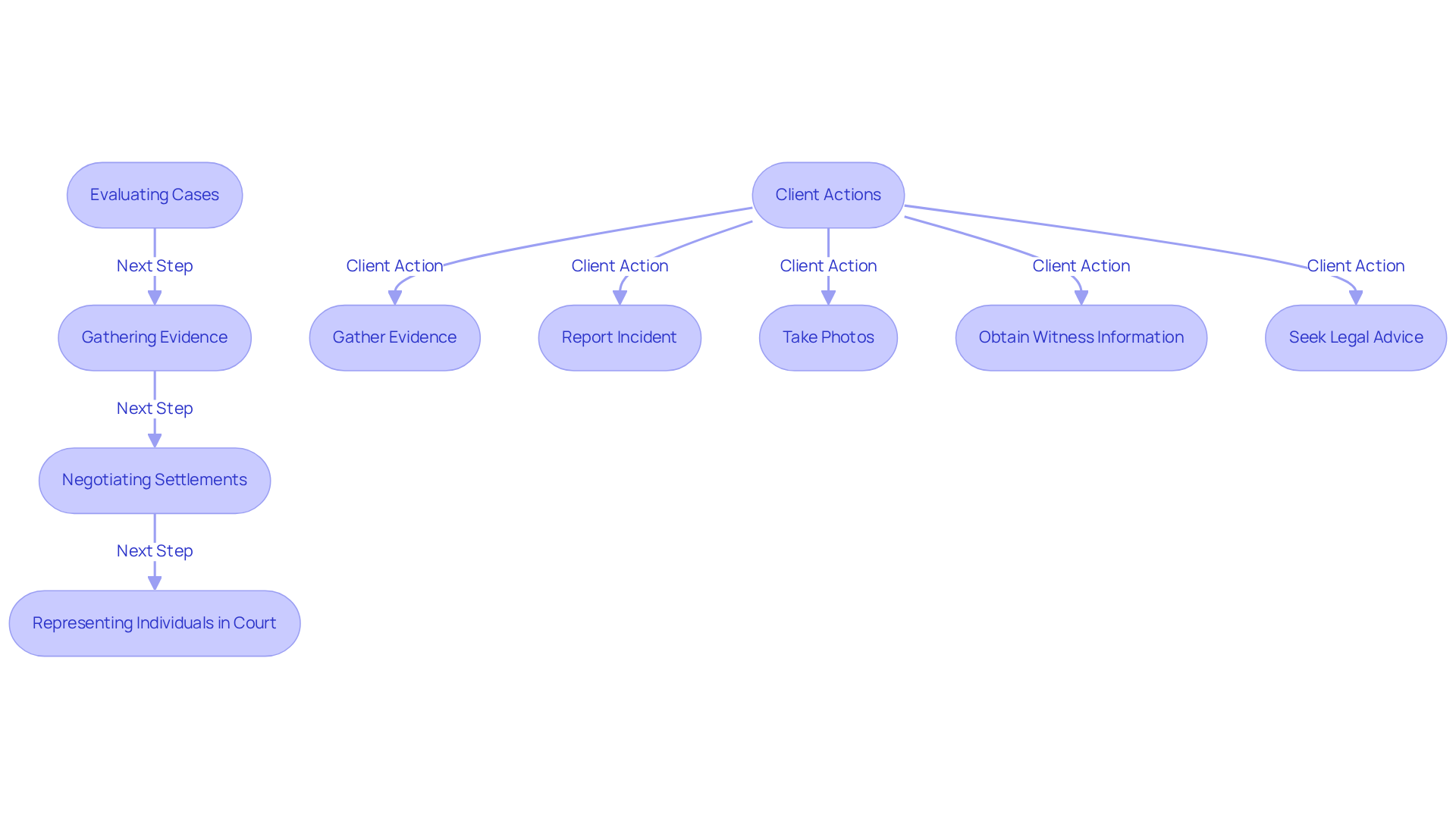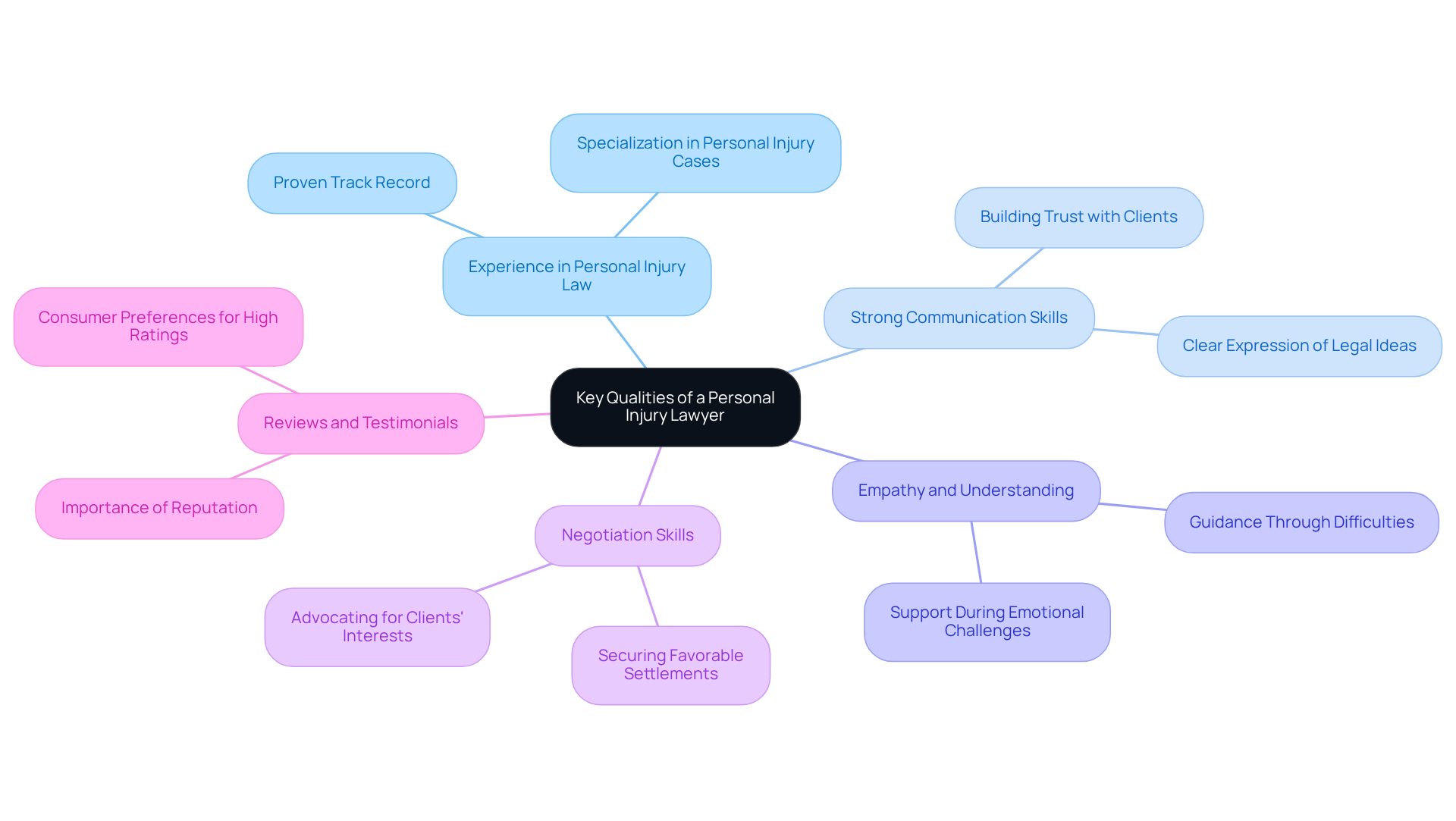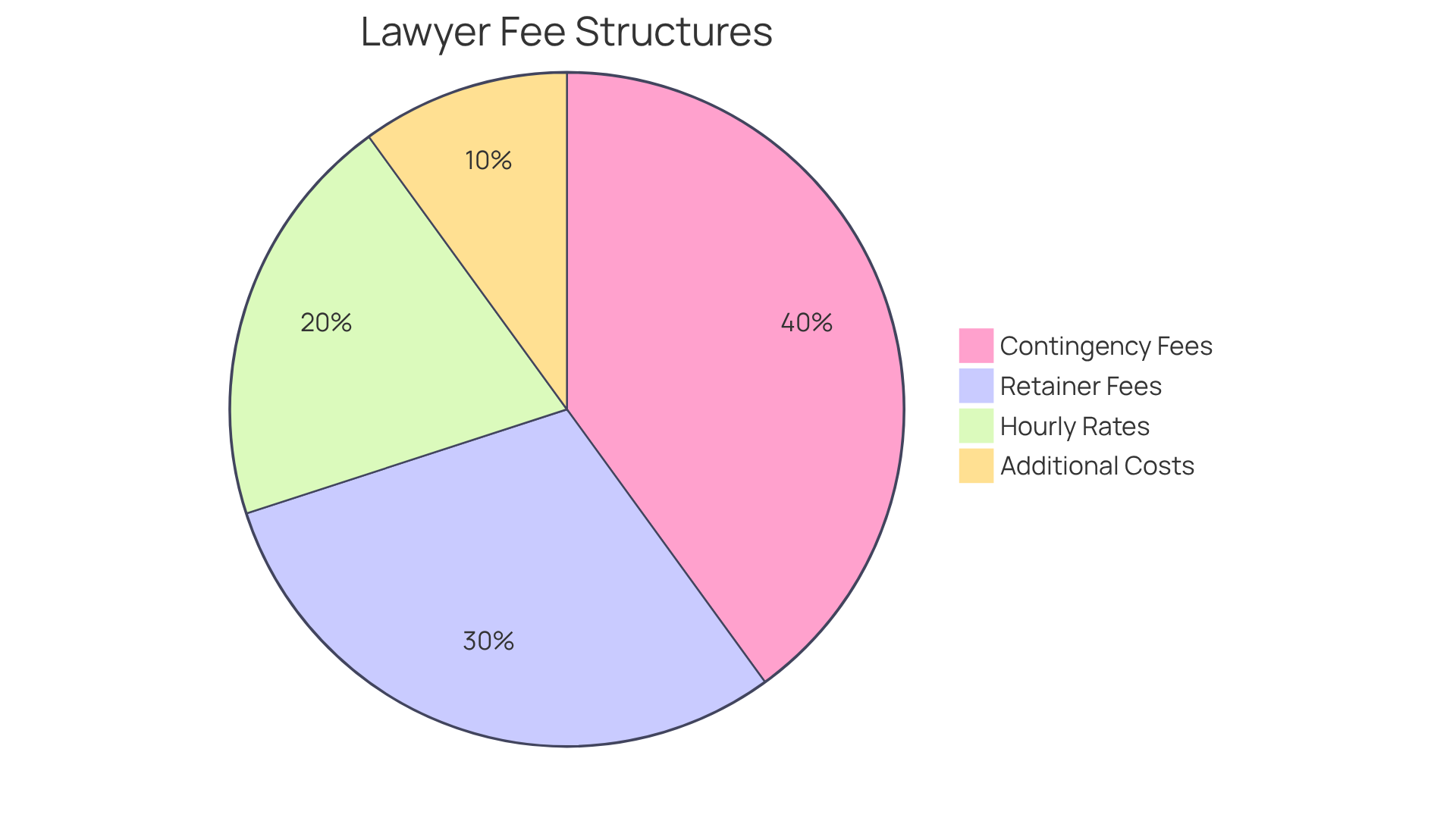Overview
This article presents a four-step process for selecting the right accident and personal injury lawyers. It highlights the crucial roles these professionals play in navigating the complexities of legal issues.
- First, it’s essential to understand what lawyers do for you.
- Next, identifying key qualities is vital—look for experience and strong communication skills.
- Prepare for consultations by knowing what to ask, and don’t overlook the importance of understanding fee structures.
Each step is filled with practical advice, like assessing a lawyer’s background and payment options, ensuring that you can make informed decisions tailored to your legal needs. Remember, you’re not alone in this fight. We’re here to support you every step of the way.
Introduction
Choosing the right accident and personal injury lawyer can feel overwhelming, especially in the wake of an accident. With countless attorneys competing for your attention, it’s crucial to understand their roles and the qualities that distinguish them. How do you navigate this complex landscape to find a lawyer who truly understands your unique situation and has the skills to advocate for your rights? This guide outlines four essential steps to simplify your selection process and empower you to make informed decisions. We’re here to fight for your family and ensure your voice is heard.
Understand the Role of Personal Injury Lawyers
Accident and personal injury lawyers are dedicated advocates for clients who have been harmed by the negligence or misconduct of others. They play a vital role in ensuring that victims receive the support they need. Their primary responsibilities include:
- Evaluating Cases: Assessing the merits of a case to determine if a valid claim exists, especially for victims of car accidents and workplace injuries.
- Gathering Evidence: Collecting essential documentation, witness statements, and medical records to build a compelling argument. This is crucial for ensuring that injured workers receive the compensation and medical care they deserve.
- Negotiating Settlements: Accident and personal injury lawyers engage with insurance firms to secure fair compensation for their clients, advocating tirelessly for personal harm victims throughout the process.
- Representing Individuals in Court: If a settlement cannot be reached, accident and personal injury lawyers advocate for individuals in court, defending their rights and interests, particularly in cases involving slip and fall incidents or construction accidents.
Understanding these roles helps clients recognize the that accident and personal injury lawyers offer in their situation, ensuring they are properly represented during legal proceedings. If you find yourself involved in a construction accident, it’s essential to act swiftly—gather evidence, report the incident, take photos, obtain witness information, and seek legal advice before speaking with insurance representatives. Remember, you’re not alone in this fight; we’re here to support you every step of the way.

Identify Key Qualities and Experience in a Lawyer
When choosing a personal injury lawyer, it’s crucial to focus on key qualities and areas of experience that can make a difference in your case:
- Experience in Personal Injury Law: Look for a lawyer who specializes in personal injury cases and has a proven track record. With over in the U.S., choosing one with significant experience can greatly impact the outcome of your case.
- Strong Communication Skills: A capable attorney should clearly express legal ideas and maintain open communication channels with clients. Effective communication builds trust and ensures clients are informed throughout the legal process, which is vital for client satisfaction. Studies show that attorneys who excel in communication are more likely to achieve favorable results.
- Empathy and Understanding: Personal injury cases often come with emotional challenges. A compassionate attorney can provide essential support, guiding clients through their difficulties with empathy and care.
- Negotiation Skills: Strong negotiation abilities are essential for securing favorable settlements. Lawyers who are adept negotiators can effectively advocate for their clients’ best interests, often leading to better compensation outcomes.
- Reviews and Testimonials: Researching past client experiences offers valuable insights into an attorney’s reputation and effectiveness. Nearly 90% of consumers prefer to hire law firms with at least four-star reviews, highlighting the importance of reputation in the decision-making process.
By focusing on these qualities, clients can better assess potential accident and personal injury lawyers and choose one who meets their specific needs and expectations. Remember, you’re not alone in this fight; we’re here to support you every step of the way.

Prepare for Initial Consultations with Lawyers
To make the most of your initial consultations with personal injury lawyers at Vasquez Law Firm, follow these essential preparation steps:
- Schedule Your Free Consultation: Begin by booking a free consultation with our attorneys to discuss your case. This is your opportunity to take the first step toward justice.
- Gather Documentation: Collect all relevant documents, such as medical records, accident reports, and any correspondence with insurance companies. Having these on hand will streamline your discussion.
- Prepare a List of Questions: Write down inquiries to pose to the attorney—questions like their experience with similar cases, their approach to handling your situation, and their expected timeline. This will help you gauge their expertise and fit for your needs.
- Be Ready to Discuss Your Case: Clearly explain the details of your condition, how it occurred, and any impact it has had on your life. Remember, sharing your story is crucial in this process.
- Understand Your Goals: Know what you hope to achieve from the legal process, whether it’s , lost wages, or pain and suffering. Having clear goals will guide your conversation with accident and personal injury lawyers.
Being well-prepared not only helps you evaluate whether the attorney is a good fit for your needs, but it also facilitates a productive discussion. If you have any questions or need further assistance, remember: we’re here to support you every step of the way.

Understand Fee Structures and Payment Options
Understanding the various fee structures for accident and personal injury lawyers is crucial, especially when navigating the complexities of legal claims. Here’s what you need to know:
- Contingency Fees: This arrangement means your lawyer only gets paid if you succeed in your claim. Typically, they take a percentage of the settlement or award, usually between 25% and 40%. At Vasquez Law Firm, our accident and personal injury lawyers work on a contingency fee basis for personal injury cases, which means you pay nothing unless we win. This model aligns our interests with yours, motivating us, as accident and personal injury lawyers, to secure the highest possible settlement and ensuring that financial limitations never prevent you from pursuing the justice you deserve.
- Retainer Fees: Some attorneys may ask for an upfront retainer fee, which acts as a deposit for future services. These fees can vary significantly, usually ranging from $1,000 to $5,000, depending on the attorney's expertise and the complexity of your case. It’s essential to understand the specifics of retainer agreements, as they may be refundable or non-refundable based on the outlined terms.
- Hourly Rates: In certain situations, attorneys might charge by the hour, leading to unpredictable costs. While this method is , it’s important to be aware of it if it’s presented to you.
- Additional Costs: Keep in mind other potential expenses, such as court fees, expert witness fees, and costs for obtaining medical records. These can add up quickly, so it’s vital to discuss all possible expenses with your legal advisor upfront.
At Vasquez Law Firm, we also offer flexible payment plans tailored to your financial situation for other practice areas, ensuring that everyone has access to quality legal representation. With offices in Charlotte, Concord, and Huntersville in North Carolina, as well as locations in Florida, we are strategically positioned to serve you wherever you are. Understanding these fee structures will help you budget for legal expenses effectively and ensure you choose a lawyer whose payment options align with your financial situation.

Conclusion
Choosing the right accident and personal injury lawyer is a crucial step for anyone seeking justice after an unfortunate incident. Understanding the roles these legal professionals play and the qualities that make them effective advocates allows individuals to make informed decisions that can significantly impact the outcome of their cases.
This guide has outlined essential steps:
- Recognizing the vital responsibilities of personal injury lawyers
- Identifying key qualities to look for
- Preparing for initial consultations
- Understanding fee structures
Each of these elements is pivotal in ensuring clients find the right legal representation tailored to their specific needs and circumstances.
Navigating personal injury claims can feel overwhelming. But remember, support is available. By taking proactive steps to choose the right lawyer, you empower yourself in the pursuit of fair compensation and justice. Whether you're facing the aftermath of a car accident or a workplace injury, the right attorney can make all the difference in navigating this challenging process.
We’re here to fight for your family. Your future matters to us. Yo Peleo — We Fight.
Frequently Asked Questions
What is the role of personal injury lawyers?
Personal injury lawyers advocate for clients who have been harmed by the negligence or misconduct of others, ensuring that victims receive the support and compensation they need.
What are the primary responsibilities of accident and personal injury lawyers?
Their primary responsibilities include evaluating cases to determine valid claims, gathering evidence such as documentation and witness statements, negotiating settlements with insurance firms, and representing individuals in court if necessary.
How do personal injury lawyers evaluate cases?
They assess the merits of a case to determine if a valid claim exists, particularly for victims of car accidents and workplace injuries.
What type of evidence do personal injury lawyers gather?
They collect essential documentation, witness statements, and medical records to build a compelling argument for their clients.
How do personal injury lawyers negotiate settlements?
They engage with insurance firms to secure fair compensation for their clients, advocating tirelessly for personal harm victims throughout the negotiation process.
What happens if a settlement cannot be reached?
If a settlement cannot be reached, accident and personal injury lawyers represent individuals in court, defending their rights and interests.
What should I do if I am involved in a construction accident?
It is essential to act swiftly by gathering evidence, reporting the incident, taking photos, obtaining witness information, and seeking legal advice before speaking with insurance representatives.




